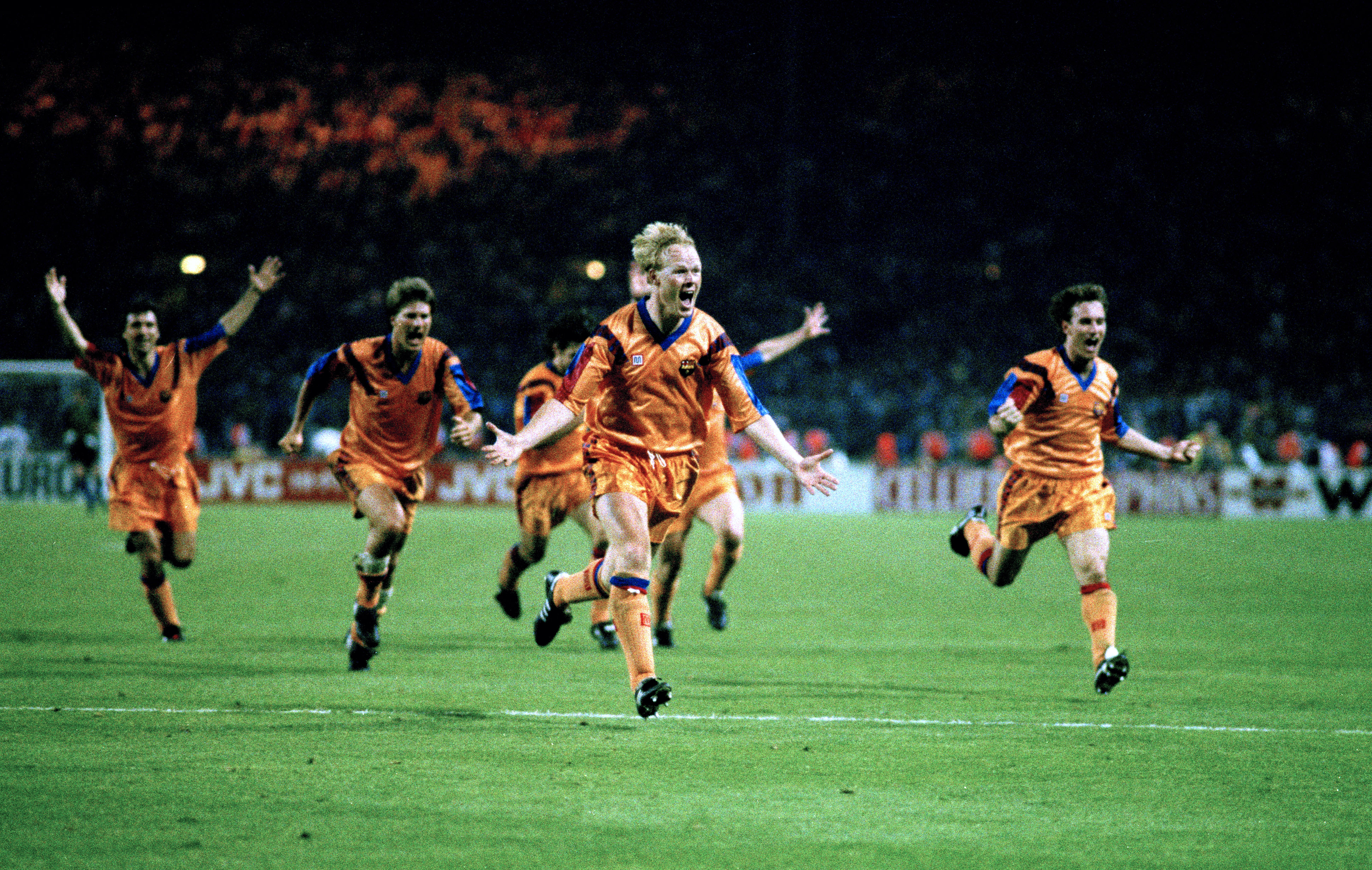Analysed: How Joel Campbell can still play a big part in Arsenal's title challenge
John Robertson believes that the Costa Rican provides a different threat that could liven up Arsenal's attack from now until May...
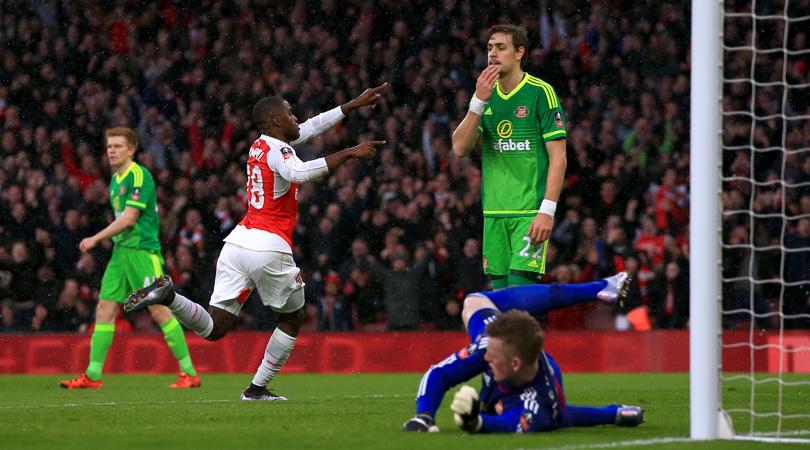
Up until recent seasons, Arsenal have been the most readily associated with a singular, definitive approach to the game. Their short passing, possession-heavy style employed with a view to creating a high number of chances inside their opponent's penalty box, has historically been the envy of rival clubs and fans throughout the league. Indeed, the Frenchman's arrival in England opened the eyes of many to what a 'passing game' might actually be capable of achieving.
There's an argument to be made that states that Wenger has failed to innovate since those magical years in which Thierry Henry, Patrick Vieira, Robert Pires et al achieved so much under his tutelage.
For all of Arsenal's admirers, however, the club still isn't short of its detractors. There's an argument to be made which states that Wenger has failed to innovate since those magical years in which Thierry Henry, Patrick Vieira, Robert Pires et al achieved so much under his tutelage. As a result, other clubs and managers have either surpassed him at his own game, or designed new tactics and strategies to nullify much of what was previously so dangerous.
Wenger's miserable record against Jose Mourinho teams has often been cited as evidence of the latter.
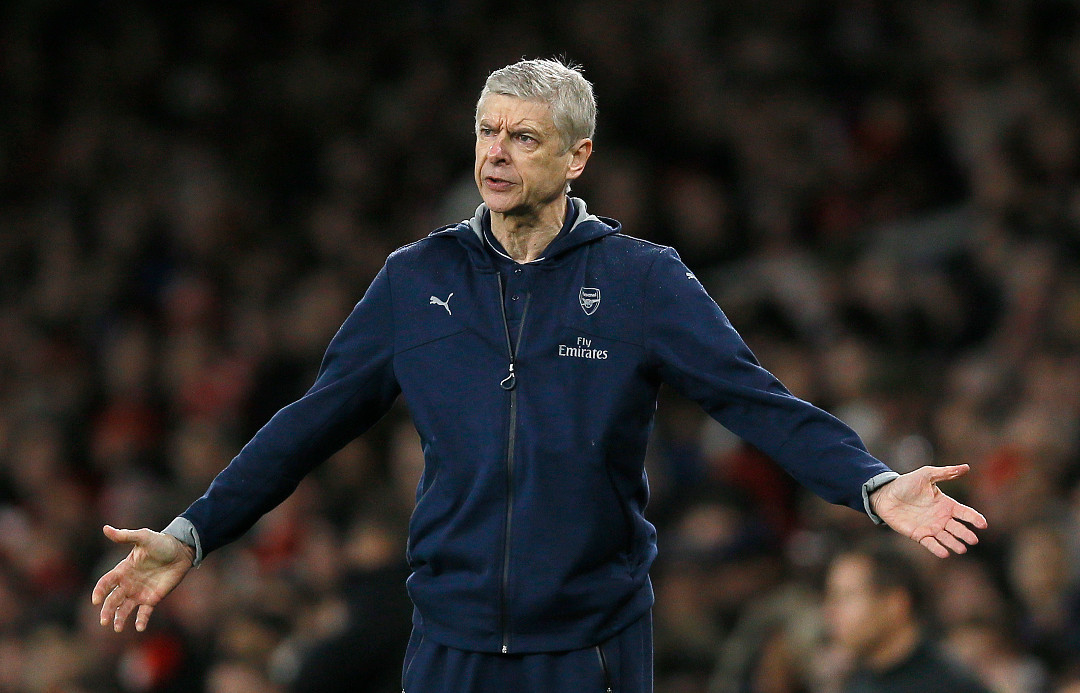
Despite this, Arsenal currently find themselves top of the Premier League, boasting the third-best defensive record and the joint-fourth-best attack. In large part, this is down to Wenger becoming more adaptable, unafraid to employ a counter-attacking system in which his team don't need so much of the ball to succeed. The 2-1 victory against Manchester City in December is testament to how effective Arsenal can be when they do surge forward after allowing their opposition time on the ball.
However, the signs aren't all positive and there remains an undercurrent that suggests things could be in need of shaking up in attack if Arsenal are to make good on their latest title challenge.
The 2-1 victory against Manchester City in December is testament to how effective Arsenal can be when they do surge forward after allowing their opposite numbers time on the ball.
All too similar?
In attack, Arsenal were turgid against Newcastle in their last Premier League game, a somewhat fortuitous 1-0 win. All too often it seemed as though their sole idea was to move the ball as quickly as possible into the feet of Mesut Ozil and keep fingers crossed that the German could make something happen via another of his trademark miracle passes.
The best features, fun and footballing quizzes, straight to your inbox every week.
Things weren't helped by the fact that Theo Walcott and Alex Oxlade-Chamberlain were so insistent on keeping the Newcastle defenders between themselves and the goal, allowing them to receive possession easily enough but making it difficult to gain forward ground quickly. The result was always the same: balls into feet, followed by an attempted dribble or the kind of pass that they've shown no consistent ability to make in the past. Unsurprisingly, then, the duo's impact when it came to creating high-quality chances was decidedly muted.
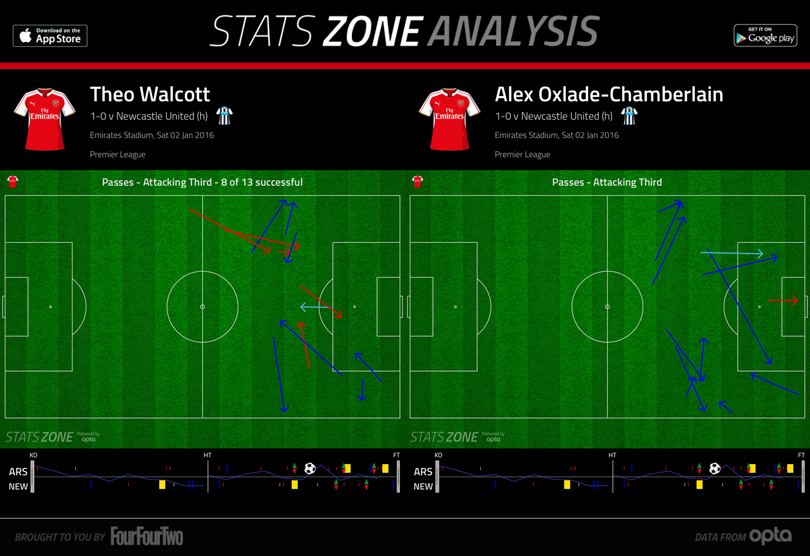
Oxlade-Chamberlain's passing graphic looks superior to that of Walcott's, but that's simply because he completed more. Successful passes retain possession and allow you to continue looking for openings, of course, but playing the ball across the pitch so consistently doesn't put a defence under pressure and serves to undermine your own place on the flank. The story was very similar in the previous match, against Bournemouth.
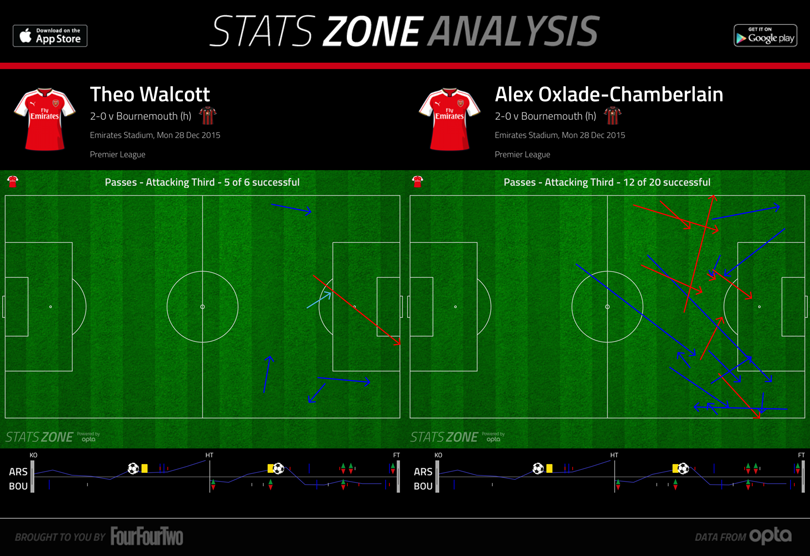
While it's easy to say that the lack of chances created by the pair is acceptable given both of the above games ended in victories, that line of thought doesn't engage with the problems that exist across Arsenal's frontline. Only a goal from a corner provided the points against Newcastle, and if it wasn't for the heroics of Petr Cech at the other end, they would have left with nothing.
The battering ram
To put it bluntly, if his teammates are stealthy infiltrators then Campbell is a battering ram
Arsenal do have a potential solution to this lack of diversity in forward areas in the form of Joel Campbell. The Costa Rican has found it difficult to cement a role within Wenger's system given that his natural style of play is so far removed from the sort of intricacy that has come to define an Arsenal player over the past 20 years, but that doesn't mean that he can't serve a purpose.
To put it bluntly, if his team-mates are stealthy infiltrators then Campbell is a battering ram. Forget about passing it around in front of the defence endlessly looking for the perfect ball, Campbell much prefers to sit on the shoulder of the last defender and run through onto balls played in behind. When he gets on the end of them he is equally likely to send a thunderous shoot into the roof of the net or cross it so high that the stadium's cameramen have to wear hard hats.
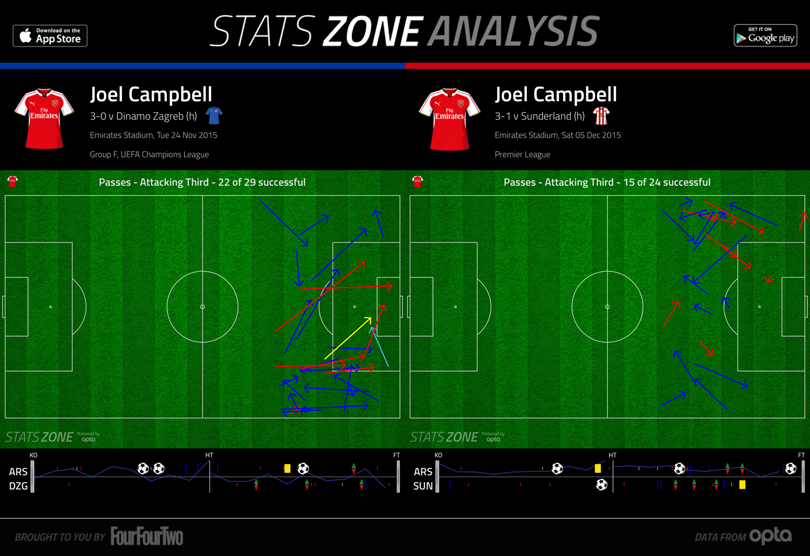
He's an unpredictable entity, but that's the point. Rather than waiting for the perfect pass, Campbell simply attempts an incredible volume of passes. In a team of such a predictable and focused philosophy, Campbell provides the point of discord that not only forces his team to broaden their horizons but also forces his opponents to think about multiple problems at once.
RECOMMENDED Rated: 6 Arsenal stars who had points to prove against Sunderland
It's all very well, as Newcastle proved, to defend against a team looking to drop the ball short and play through you, but it's another thing entirely if that same team also has a player looking to run and chase everything so tirelessly.
Campbell provides the point of discord that not only forces his team to broaden their horizons, but also forces his opponents to have to think about multiple problems at once.
In particular, Campbell's skill set is perfectly suited to those games in which Wenger decides he wants to counter-attack. A tireless runner up and down the flanks is ideal for the system: he defends when you're looking to encourage a team onto you, and then sprints forward as though his life depends on it when possession is regained.
On two fronts
Looking at where Walcott and Oxlade-Chamberlain picked up the ball against Newcastle highlights how much time and space they dedicate to receiving possession in safe areas, so frequently around the halfway line – almost as you'd expect from wingers playing a 4-4-2.
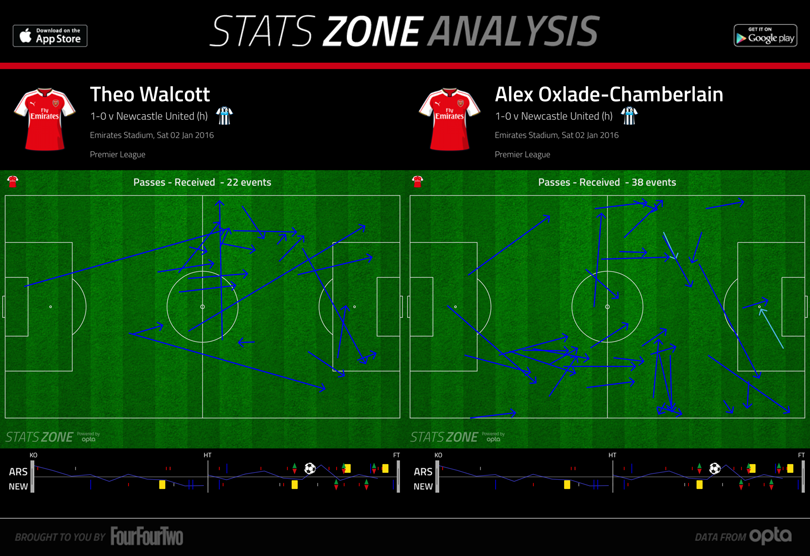
If we compare this to passes received by Campbell (in the last two games in which he's featured for at least 70 minutes) then the different pressures he causes defences is clear. Not only is he picking up the ball in more advanced positions more often, but the 23-year-old is always sticking more rigidly to a specified zone of the pitch.
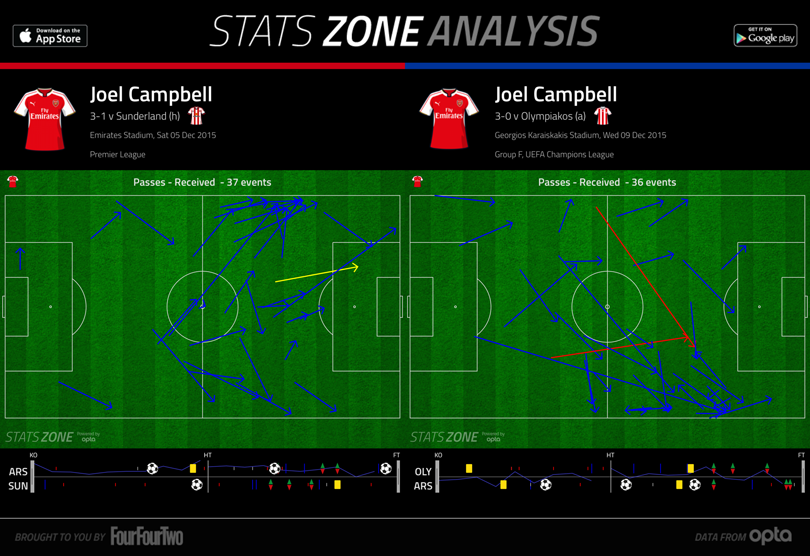
While that might seem like a negative, Campbell's insistence on dominating that area means his opponents must always position someone around him to counter his presence. In theory, that can lead to better manipulation of a defence and, in turn, create space for other players to exploit.
The injured Alexis Sanchez is superb at doing a similar thing, albeit to a much higher level. In the absence of the Chilean, however, Campbell is the best option Arsenal have when it comes to deploying a diverse frontline. Sometimes the most complex solution is not borne of the most complex components.
Campbell's current contract expires at the end of the season, but he's choosing a good time to catch Wenger's eye after previously mixed loan spells at Lorient, Betis, Olympiakos and Villarreal. Saturday's goalscoring display in the FA Cup against Sunderland prompted praise from his manager, who declared: “He’s getting stronger in every game. He makes me think about Francis Coquelin last year. Nobody expected him and suddenly he knocked on the door and said, ‘Hey, my friends, I’m here’.
“What I like is you see the way he plays, he has more certainty in his game, more assurance in the final third. And he scores goals.”
More of that will keep him in the Frenchman's good books, where he needs to stay.
RECOMMENDED
 Join The Club
Join The Club





